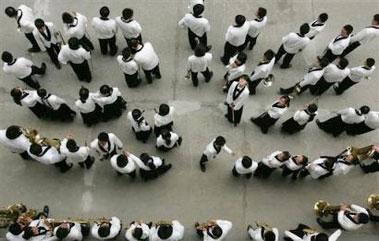China will scramble mobile phone signals in some exam halls and have police
stand guard in a bid to "guarantee order and smooth exam operation," as millions
of students take the highly competitive college entrance exams this
month, according to media reports on Friday.

Students prepare to
perform at a school event that aims to promote Olympic spirit and
knowledge among youths in China in Beijing Friday, June 2, 2006. Some 9.5
million young people will take the June 7-8 college entrance exams, but
only one in four will be eligible for college enrollment. [AP]
|
Some 9.5 million young people will take the June 7-8 college entrance exams,
but only one in four will be eligible for college enrollment, the Xinhua
News Agency said. The Chinese government last month said it plans to further
restrict enrollment to improve teaching conditions and ease graduate employment
pressures.
Last year, some 1,700 students across the country were disciplined for
cheating, including 30 who used hidden telecommunications equipment to get
answers during the test or who were caught selling exam contents, it said.
Earlier this month, three people were arrested for selling fake exam papers
over the Internet for 1,000 yuan a subject, it said.
The government warned the public not to fall for the scam, noting that exam
papers are state secrets and those caught leaking them face three to seven years
in prison, it said.
The anti-cheating campaign is part of a larger effort to clean up China's
academic community amid a spate of high-profile plagiarism and fake research
cases.
Some provinces were planning to use devices that would block mobile phone
signals in exam halls, though the Education Ministry warned that if such
equipment was being used it should be proved safe to humans.
"Those, who intend to use mobile phone shielding devices, must show relevant
report to prove the devices they are using will do no harm to people
physically," Xinhua quoted Lin Huiqing, a ministry official, as saying.
Xinhua said that police would be standing guard at exam halls to "ensure
smooth operation of the exams," and that students would be required to sign
documents promising not to cheat.
China has suffered a series of scandals in recent months involving academics
who were caught lying about their credentials or faking research.
Last month, a dean at Shanghai Jiaotong University, one of China's top
science schools, was dismissed after investigators found he faked research which
had been hailed as a breakthrough new computer chip.
In April, another Shanghai university dismissed a scientist who it said lied
about his academic record. Similar accusations led to the firing of a professor
at elite Tsinghua University in Beijing in March.
The scandals have been especially embarrassing to the leaders at a time when
they are promising to spend more on scientific research in hopes of developing
profitable technologies.